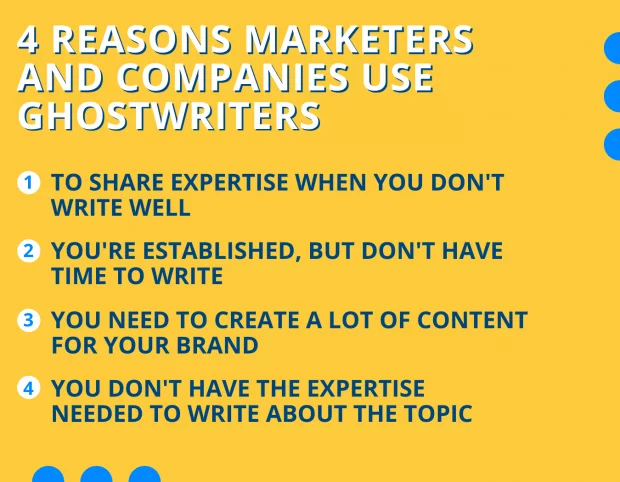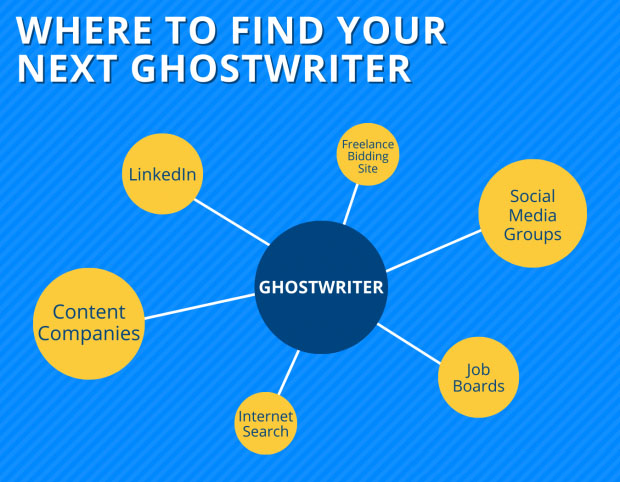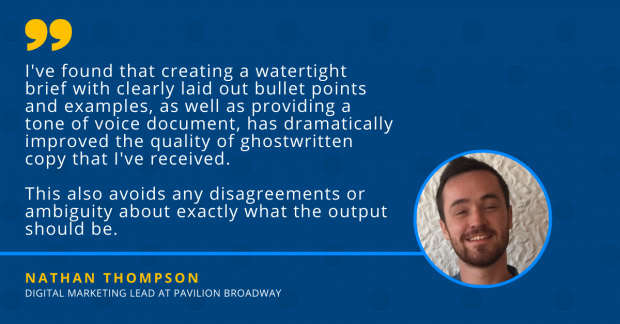
Ghostwriting is a tried-and-true profession and a powerful way to get content written when you don’t have the time, talent or desire to do it yourself. Whether you’re interested in publishing a book or just want more high-quality content for your website, hiring a ghostwriter puts you in some pretty good company.
Did you know some of these works were ghostwritten?
- Iacocca: An Autobiography was mostly penned by author William Novak on behalf of, and using stories and information from, Lee Iacocca.
- Profiles in Courage wasn’t written by JFK; the wordsmithing actually came from Kennedy’s speechwriter Ted Sorenson.
- The many stories featuring Nancy Drew, which have been published over almost nine decades, were written by numerous ghostwriters under the name Carolyn Keene.
- All but 35 of The Babysitters Club books were ghostwritten by Peter Lerangis and others, not by author Ann M. Martin.
Publishers have put the power of ghostwriting to work to churn profits and meet voracious fan demands for centuries. And in today’s competitive marketing world, you can put good ghostwriters to work to scale content creation and publishing processes, improve authority and SEO, and better connect with your target audience.

But before you can do those things, you must answer the question, “how does ghostwriting work?” The comprehensive guide below provides everything you need to get started — whether you’re new to hiring ghostwriters or just want to develop a better process for it.
What Is Ghostwriting?
Ghostwriting occurs when someone contributes to creating content without credit for doing so. They don’t get a byline or author credit; in fact, many times someone else’s name appears as the author of the content. In exchange for credit, the person doing the writing typically receives monetary compensation.
ALSO – Ghostwriting Jobs 101: How They Work, Where to Find Them and How to Thrive
Reasons Marketers and Companies Use Ghostwriting
Ghostwriters can offer a number of benefits for yourself or your organization. Here are just a few reasons someone might choose to use a ghostwriter.
- Sharing your expertise when you don’t write well. If you’re an expert or professional in a niche with knowledge to share, ghostwriters can help you do that if you’re not great with the written word. You might create extensive notes and outlines for the writer to work from. The writer might also interview you to get your story or message before committing it to paper.
- You already have a name but don’t have enough time to write. Someone who already has a recognized name in the niche may need help keeping up with demands for content. Many online marketing pros, including Rand Fishkin and Neil Patel, for example, have used ghostwriters to help keep their content production at scale when they’re busy with other tasks.
- Creating lots of content for your brand. Not all ghostwritten work gets an author byline stamped on it. Many companies publish blogs, articles and other content from the brand as a whole and not a single person. Ghostwriters are ideal for online content marketing and branding, which may require that you publish dozens or even hundreds of pieces a week or month. Being able to keep up with that pace while providing high-quality content that resonates with your audience is impossible.
- You don’t have the exact expertise. In some cases, the ghostwriter is actually the one with the knowledge. For example, someone who is a chef may want to launch a coaching business for rising restauranteurs. They come up with an idea to provide a white paper on legal issues for restaurants as a lead generation tool, but they themselves aren’t a legal expert. They might hire a ghostwriter who has both restaurant and legal expertise to draft the white paper.
ALSO – What Is a Ghostwriter Best Able to Help With?

Reasons Writers Agree to Ghostwrite Content
So, using ghostwriters lets you expand your writing team, gain access to writing skills and potentially draw on other people’s knowledge and experience. But why would a ghostwriter agree to create content for you without having their name attached to it?
Mostly, the answer is that they get paid to write the content. Obviously, with money as the motivator, typically the better you pay, the more professional and skilled a ghostwriter you can hire. You do have to be careful when hiring someone for freelance writing, and we’ll cover how to find qualified pros that will do an excellent job in just a bit.
p.p1 {margin: 0.0px 0.0px 0.0px 0.0px; font: 12.0px Helvetica}
Other reasons people choose to work ghostwriting gigs rather than publish content under their own names include:
- They have another business or personal brand and they don’t want to interfere with that. For example, someone who is attempting to make a name as a science fiction author may still need to pay the bills. Ghostwriting lets them put their other expertise to work without impacting their author name.
- They don’t want any recognition. Some writers are exceptionally shy. Others have personal reasons they don’t want their name splashed across the internet. Whatever the reasons, the fact that a qualified writer doesn’t want the attention of a byline can work in your favor.
- They enjoy writing for hire on a number of topics. Some writers simply enjoy doing work for other people that lets them research and write about different things all the time. They don’t want to be tied down to a specific niche or responsible to their own platform, and they may have learned they can make a good living by providing A+ service and content to clients.
When Is Ghostwriting Not a Good Method to Generate Content?
Ghostwriting sounds amazing, right? But before you start handing your content off to a freelance writer, make sure ghostwriting is the right move.
It’s generally known that everything that appears on your website probably wasn’t written by you. Most people even realize that your full-time staff might not be responsible for every word. But some content comes with expectations that you either wrote it yourself or had a very hefty hand in the process —examples include letters from the CEO or very personal posts that include your own testimonial about something.
In deciding whether to hire a ghostwriter for a project, ask yourself these questions:
- Do you have an extremely personal tie to this story that would benefit from an authentic first-person account?
- Will your readership feel betrayed if they ever find out you didn’t write the content yourself?
- Will you have to disclose extremely sensitive details to ensure the ghostwriter has the right understanding to write the piece, even though those details won’t make it into the published piece?
In these cases, you may want to write the content yourself. If you’re worried about how the finished piece might look because you’re not a strong writer, you might hire an editor to fix it all up while maintaining the authenticity of your style and voice.
What Are Some Common Legal Concerns With Ghostwriting?
Ghostwriting is completely legal. Technically, it’s an exchange of goods or services. You pay someone, and they give you words they have written (along with the copyright for the content).
But there are some legalities to contend with to ensure you don’t end up on the losing end of a ghostwriting arrangement. Here are a few legal concerns to pay attention to when using ghostwriters to create any type of content.
Copyright: Who Owns the Content?
This is probably the most common concern and is the most important thing to ensure you cover in ghostwriting contracts. Universal Copyright Convention states that copyright for a creative work, including writing, automatically goes to the creator at the time of creation. Contrary to popular belief, you don’t have to register copyright to enjoy the benefits of owning your own work.
In the case of ghostwriting, you definitely don’t want the writer to maintain this default ownership. The contract must clearly state that the writer is giving up copyright of the work in exchange for the payment you’re offering.
Consider including language in your contract that states:
- The writer agrees that the works created under the contract are “works for hire.”
- The writer agrees that the works belong to the client.
- The writer agrees that copyrights associated with the work also belong to the client.
- In cases where the work might not be considered “works for hire” under any law, the writer agrees to “sell, assign and transfer” rights, title and interest in the work to the client.
Disclosures: Who Can Talk About Authoring the Content?
If you pay someone to write a book or article and then put your own name on it, you may not want the person taking credit for the work in other ways. It’s a good idea to put a nondisclosure agreement in your contract that states the writer agrees to hold his or her participation in the project confidential.
How tight you want to make the NDA depends on your brand and what you’re having someone write. In most cases, clients typically don’t want someone advertising the fact that they wrote the content. They might not mind if someone tells close family or friends what they’re working on. And in some cases, the writer may request permission to share information about the project or snippets of the work with other potential clients to demonstrate their experience and expertise. Work with your writer to ensure the NDA in any contract serves both your needs.
Pay: What Are the Terms of the Transaction?
How you pay, what you pay and when you will pay it should all be covered in detail in any contract. Being as specific as possible when you contract a ghostwriting service protects your interests and helps stave off disagreements later in the process.
The contract should include:
- How much you’ll pay. This can be a flat fee for the work, an hourly payment or payment by the word or page. The easiest way to ensure you’re on the same page with a potential writer is to pay by the word. Make sure you define how the words will be tallied. You might specify that you’ll use the word count from a specific program or that you’ll use an industry benchmark such as 250 words per typed, double-spaced pages.
- How you’ll make payment. Will you pay via a service such as PayPal (and if so, who is responsible for the resulting fees), via an electronic funds transfer into the writer’s bank account or via a mailed check?
- When you will pay. Do you pay upon acceptance of the work? Are you planning to pay within 30 days of acceptance? The ghostwriter or service may have their own terms. Common options are Net 15 or 30 days or full or partial payment upfront. If the project is large, you may set up milestones to make partial payments as the writer delivers various parts of the work.
ALSO – How Much Should I Pay a Freelance Writer?
Ghostwriting Contract Checklist
If you’re drafting a ghostwriting contract, consider working with a legal professional to ensure it has all the clauses and details required to protect you and your company. Make sure it includes everything in this checklist; it’s also a good idea to look for these things in any contract offered by the ghostwriting service.
- Clauses that state the copyright belongs to you (as stated in the section above)
- Confidentiality agreement or NDA (as stated in the section above)
- Payment details (as covered in the section above)
- Clauses that define this as a contract agreement and note the writer or service is responsible for any taxes or other obligations (ensuring this can’t be perceived as a W2 or traditional employment situation)
- Details about expectations for the work, including
- Quantity — the number of blog posts, articles, product descriptions, social media posts or book chapters, for example
- Length — a range for the number of words for each piece, such as 800-1000 words for a blog post
- Timeline — when you expect various parts of the work to begin and when they should be submitted
- Revision requirements — how many revision rounds you expect to be included in the price; it’s a good idea to always include at least one round
- Research requirements — how much research do you expect the writer to do for your project; note that more research takes more time and may increase the cost of your project
How Do You Find Qualified Ghostwriters?
Before you can enter into contract negotiations, you need someone to negotiate with. Here are some steps for finding ghostwriters for just about any project or topic.

- Search for and recruit an expert writer. You’ll need to spend some time on LinkedIn, browsing the web and popping into relevant social media groups to connect with writers who might work out. The benefit of this method of finding a ghostwriter is that you connect directly with the writer. The disadvantage is that you might spend a great deal of time sorting through writers until you find the right one, and you still don’t have any guarantees the work will get done and be exactly what you need.
- Put a ghostwriting job out on a freelance bidding site or job board. When you use this method, you wait for the writers to come to you. That reduces the work you have to do in seeking out writers, but it also means that you may get a lot of applications that aren’t even close to what you need. Depending on which site you use, you may have to wade through sub-par writers to find the one diamond in the rough.
- Work with a content company. Content companies like Crowd Content maintain a vast database of writers and can match clients with the freelancers that are best for the work at hand. They can also do the work of recruiting and validating new writers if necessary to meet specific niche needs. Other benefits of working with Crowd Content when you need a ghostwriter is that project managers and customer service pros can work alongside you throughout various stages of your project to ensure you get the content you need.
ALSO – Ghostwriters: The Secret to Maximizing Your In-House Writing Team
Some Other Best Practices for Working With Ghostwriters
Once you find the ideal writer and get the contract details worked out, it’s time to get down to the business of creating content. You might think you can drop the ball fully into the ghostwriter’s side of the court at this point, but be wary of taking your eyes completely off the process.
If you have a long-term relationship with a freelance writer who knows your business and has created content you loved in the past, you might be able to back away and let them do their thing. But instructions are still important, and if you’re working with new-to-you writers or a ghostwriting team, then you may want to follow some of these best practices to ensure optimal results.
1. Account for added time in your process.
If you’ve been creating content yourself or having in-house employees do it, you shouldn’t expect the same turn around times when you switch to ghostwriters — especially at first. And you shouldn’t assume that because you’ve passed the buck on wordsmithing to someone else that content creation no longer takes up any time on your schedule. You’re planning to put your name (or your brand’s name) on this content, so you still have to manage it.
“The biggest challenge we face when hiring ghostwriters is time,” says Zac Harding, Director or Marketing at Sense Chat Labs. “It takes time to manage ghostwriters and to reach out. If your process for managing your ghostwriters is not prepped and easy to follow you may lose their interest right away or, even if you hire them, they’ll not be used to their full potential which means money wasted.”
When working with ghostwriters, plan extra time for:
- Onboarding new writers
- Working out details of projects with writers
- Returning pieces for rounds of revisions
- Providing feedback on content to help ensure ghostwriters get increasingly closer to your ideal
- Updating ghostwritten content with any personal preferences before you publish it
2. Look for people who are knowledgeable about your field.
A common mistake that clients make when seeking ghostwriters is assuming they just need someone who can write, and that any skilled writer will do. After all, if you’re providing all the research and talking points, can’t any writer worth their salt turn it into a high-quality blog post, ebook or article?

The answer is no. Writers have unique skill sets, and you want one that:
- Writes the type of content you need. Marketing content, technical copy, journalistic articles and conversational blog posts all require different writing skills. Some writers can move between these formats and some can only do one or a few.
- Can match your voice. Many writers can adopt a client’s voice with a little practice and some samples. But some writers work best with certain types of voices, and others have such a strong voice themselves that they can’t successfully mimic yours.
- Understands — or is capable of understanding — your topic. This is especially true of highly technical or unique fields. Eric Even Haim, the cofounder and CEO of StilyoApps, says “You want to find people that are already in the field you’re in — the more specific the match is, the better. Try asking your candidate as many questions as you can to make sure you and he are on the same page and that you speak and think in the same wave.”
ALSO – How Can You Find a Great Content Writer Who Has Niche Expertise?
3. Make sure there’s a body of work your ghostwriter can reference.
The easiest way to ensure a writer can match the style, voice and content you’re looking for is to already have some of that content to show them. It’s much easier for a writer to understand what you mean by “funny and engaging” or “formal and professional” when they can read some pages you already like.
“A ghostwriter will be infinitely more effective if there’s already a body of content in place for them to use as reference material,” says Matt Diggity of Diggity Marketing and LeadSpring LLC. “As my business was growing, I wrote constantly to establish my authority as an expert in my industry. That body of work has been a huge asset that helps our ghostwriters maintain my tone and consistency as they take on responsibility.”
If you don’t already have published content under your own name or on your own site, share content from other sites and tell the ghostwriter what you like about it. That helps them hone in on what you’re looking to create.
4. Provide detailed briefs and instructions.
Writers aren’t mind readers. Even if they’ve worked with you for a while, they need instructions to create the content you want. How much instruction you provide depends on your preferences, needs and trust in the writer you’re working with.
Someone who has a long-term relationship with a single writer may be able to say “We’d like a blog post about how to paint your living room,” and let the writer run with it. But in any other case, you typically get better results and less hassle if you spell it out a bit more.
“I’ve found that creating a watertight brief with clearly laid out bullet points and examples, as well as providing a tone of voice document, has dramatically improved the quality of ghostwritten copy that I’ve received,” says Nathan Thompson, digital marketing lead at Pavilion Broadway. “This also avoids any disagreements or ambiguity about exactly what the output should be.”

When you’re creating a brief for ghostwriters, consider including, at minimum:
- Word count ranges
- Keyword requirements
- An outline of what you want included in the piece
- Style and voice instructions with examples or links to examples
- Whether content should be in first, second or third person
- Grammar requirements, such as if you want the Oxford comma used or which style guide you follow
- Topics and phrases to avoid
- Linking requirements for both internal and external linking
- Research requirements, including the types of sources you want used and competitors that should be avoided
- Who the audience is, as this helps the writer better target the piece
5. Run a calibration round — or two.
When the Enterprise team at Crowd Content works with any new client, they always run at least one calibration round. That’s a small batch of content created to the client’s specs to ensure that we actually understand those specs and are hitting them correctly.
Our Director of Enterprise Content, Lisa, always tells clients that we expect to make mistakes during the calibration round. Our project managers and writers aren’t you. We can’t know every single writing choice you would make, and so we have writers complete a handful of tasks so we can get feedback to tweak the process going forward.
We’re not the only ones who champion a calibration round. “I find it’s far more productive to have an early feedback session,” says Thompson. “If you are getting 100 pieces of product copy written, ask to receive the first 3 or 4 initially, provide constructive and annotated feedback and go from there.”
Taking the time to hold one or more calibration rounds with new ghostwriters (or new projects with existing writers) saves you a lot of potential hassle and money in the long-run.
Start Working With Professional Ghostwriting Teams Today
If you’re ready to take the plunge and reap the benefits of working with ghostwriters, contact Crowd Content or sign up for a self-serve account. We can help you find the ideal writer for your project, and our customized content solutions let you hand over as much control of the process as you’re comfortable with while ensuring the utmost quality.

Benefits of Working With Ghostwriters Through Crowd Content
You can find ghostwriters via LinkedIn, internet searches or job posts on freelancing boards, but you can also turn to professional services such as Crowd Content to make the entire process easier. Here are some reasons to work with ghostwriters via Crowd Content:
- You don’t have to worry about copyright. Our terms of service ensure clients receive copyright to the work upon payment.
- Payment methods are standardized, and you can find options to fit your budget.
- Revision requests are automatically built into the process.
- Our gamified writing system includes perks to entice writers to meet your deadlines, and since turn around times are between a few hours and a few days on average, you’re never left hanging.
- Crowd Content writers have already agreed to terms of service that cover NDAs, tax liabilities and other critical details.
- You’ll have access to thousands of writers, supporting your ability to find an experienced, expert authority regardless of what niche you’re covering at any given time.
